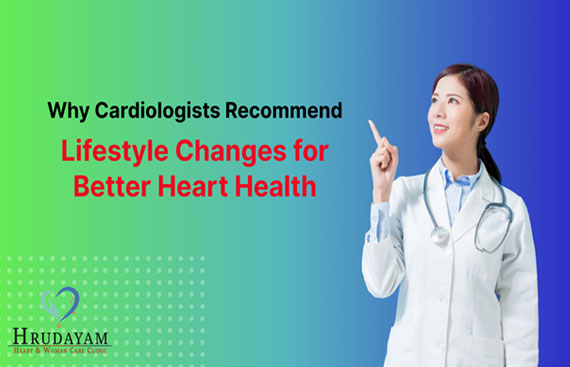Why Cardiologists Recommend Lifestyle Changes for Better Heart Health

Our heart is the most valuable piece of hardware in our body. It is our life-giving machine that functions non-stop, every moment of our existence. Nevertheless, nowadays, such heart problems are trending that one has to wonder how these diseases had not taken the world by storm earlier. It entails meeting a cardiologist in Nagpur, who will likely offer you one universal piece of advice: make lifestyle changes. Medication is crucial, but living your daily life the right way matters much more to your heart health.
Why Lifestyle Changes Are So Important
Most people mistakenly assume that heart problems end up being the case for older people or those who have ancestors with a history of such problems. In addition to the effects of age and heredity, lifestyle plays a significant role in the development of heart diseases. Just like in the statement, where slow, long-term poisoning of the heart with junk food, smoking, inactivity, and sleep deprivation is the cause of it. The root cause of heart disease, not only the symptoms, is the target when cardiologists prescribe lifestyle changes. Working out, eating healthily, quitting smoking, and getting enough sleep are all daily habits that can make a huge difference in your heart's strength and overall health.
Healthy Eating for a Healthy Heart
Food is the most important thing for our body. If it is not of the right quality, then the whole system starts to fall apart. The same thing goes for our hearts. In simple terms, being too greedy with fried, oily, and sugary foods gradually results in having high cholesterol levels and blood pressure, which are the main factors for heart disease.
First of all, the cardiologists recommend that we add the following to our diets:
- Fresh fruits and vegetables
- Whole grains such as oats, brown rice, and wheat
- Nuts and seeds in small quantities
- Low-fat protein such as seafood, poultry, and lentils
At the same time, try to lower your intake of:
- Foods that are highly processed and packaged
- Sugary beverages
- Salt and fried foods that are already consumed in excess
An even diet will help your weight remain stable and avoid the occurrence of occlusions in the blood vessels.
Exercise: The Heart’s Best Friend
Our heart is a muscle. Just like any muscle, it gets stronger with exercise. Along with this, physical activity also helps the blood circulation, maintains weight, and lowers tension. You don’t necessarily have to go to the gym. In fact, these are the kind of activities that one could do and still keep afloat: brisk walking, cycling, yoga, or even dancing.
Five days a week, at least 30 minutes of exercise should be the cardiologist’s recommendation. The main thing is consistency. Take a small step, maybe a 10-minute walk, and gradually add up the time.
Managing Stress for a Calm Heart
Typically, stress is an integral part of daily life in today's world. Working under pressure, taking care of the family, and financial instability can, one after the other, lead to mental tension. On the other hand, stress is the leading cause of high blood pressure, and it can also bring about irregular heartbeats, which are bad for your heart.
Some changes in lifestyle, such as meditation, deep breathing, listening to music, or enjoying the company of friends, can be instrumental in controlling stress. Also, a couple of relaxing moments during the day can be quite helpful.
Quit Smoking and Limit Alcohol
Smoking is the main reason behind many of the heart problems. It narrows the arteries, limits the oxygen content in the blood, and raises the risk of a heart attack. The best present that you can offer to your heart is to quit smoking.
On the other hand, an excessive amount of alcohol can bring blood pressure up and cause the heart muscle to become weak. If you are a drinker, it should be moderate and for special occasions only.
Sleep Well, Live Well
Good sleep is a thing that a lot of folks forget to take seriously. Poor sleep or irregular sleep patterns can lead to obesity, diabetes, and high blood pressure, all of which hurt the heart. Adults need to strive to get 7–8 hours of quality sleep every night. The process of having a set time for going to bed and not using electronic devices before going to sleep could help in getting a good rest.
Regular Check-Ups: Prevention is Better Than Cure
Health check-ups are a must, even if you are in good health. Simple tests like blood pressure, cholesterol, and sugar levels can reveal the onset of some disorders. Doctors in the cardiovascular field say that early detection of health matters is a life-saving way. The annual visit to the doctor and following his advice is part of a lifestyle that cares for the heart.
Small Steps, Big Results
If you want to change your lifestyle, it doesn’t necessarily mean that you have to give up a lot. It is about making small, consistent steps. Drink water instead of sugary drinks. Use the stairs instead of the elevator. Take a short walk after you eat. Eat homemade food instead of fast food. If these small deeds are done daily, you will be saving your heart for years to come.
Conclusion
Our hearts are our treasures, and we have to take care of them. Medicines and surgeries can help, but prevention is always better than a cure. Therefore, cardiologists always revolve around lifestyle changes. They are in no doubt that your eating, moving, sleeping and stress handling will be the best factors for your heart to stay young and strong. If you want to receive some advice, a cardiologist for heart health is the right person to help you with medical care and lifestyle tips so that you can live a long, healthy, and active life.
